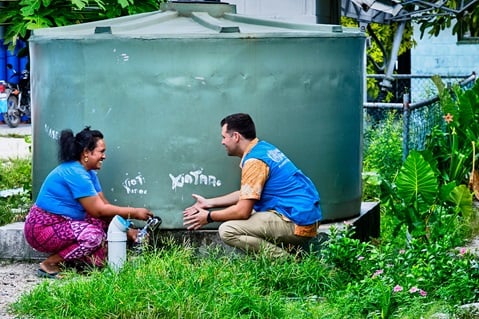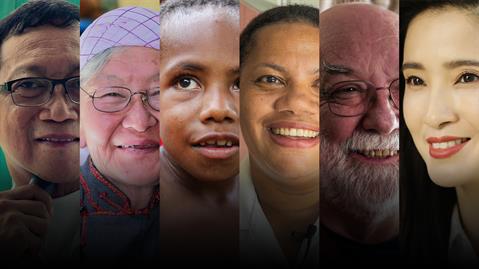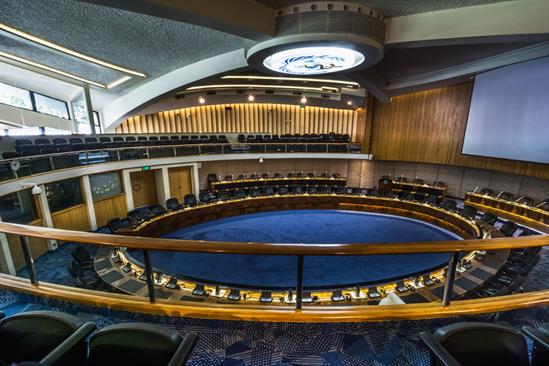/sm-toolkit-banner-2.tmb-768v.png?sfvrsn=bc418f7a_2)
Welcome to the #RCM76 social media toolkit!
This toolkit is designed to help delegates, partners and health leaders amplify the key priorities of the seventy-sixth session of the WHO Regional Committee for the Western Pacific.
Use your social media channels to:
- Share a personal story related to the key topics of #RCM76.
- Reflect on your experience at #RCM76 – don’t forget to use the hashtag so we can follow along! Tag @whowpro - and any other relevant accounts you wish.
- Help share information about the key topics being addressed at #RCM76. Use the suggested messages and social media images by saving an image to your device and adding it to your post.
- Advocate for alcohol and tobacco control in your country and community.
- Call for climate action to support health system safety and resilience.
- Emphasize the need for investing in oral health and its integration into primary health care (PHC).
- Tell us how the International Health Regulations (2005) and its amendments can help save lives from public health emergencies.
Key messages
Climate change and health system safety and resilience
/sm-toolkit-climate-(2).tmb-479v.png?sfvrsn=b73fa1a5_1)
- The climate crisis is a health crisis. An average of 43 000 people die due to storms, floods and landslides each year in the Western Pacific, and climate change further threatens livelihoods and health systems.
- By 2050, global sea levels will rise 15-30cm, putting Pacific islands health facilities at direct risk.
- Health systems must adapt, from solar power and clean water to sustainable supply chains.
- The health sector must also reduce its own carbon footprint, contributing to solutions while saving lives.
- WHO in the Western Pacific is working with countries and partners to build climate-resilient, safe and low-carbon health systems across the Region.
Example post:
The climate crisis is a health crisis. From rising seas to stronger storms, health systems in the Western Pacific must adapt and stay resilient. At #RCM76 we call for urgent #ClimateAction to protect lives and health. @whowpro
Success story – Fiji weaving health for all
With WHO and KOICA support, Fiji launched the US$ 6.41 million SHAPE Project (2019-2025) to tackle climate-driven health risks like dengue, diarrhoea, and water scarcity. WHO’s vulnerability assessments of 204 health facilities flagged 50+ high-risk facilities and one national laboratory at risk, now being retrofitted with traditional knowledge and modern solutions including solar power, safe water, and sanitation. WHO issued first-ever climate-resilient health facility guidelines, helping Fiji train health workers and be prepared for cyclones, floods, and water scarcity. Read the full story.
Implementing the International Health Regulations (2005) amendments
- Health threats do not stop at borders and regional solidarity is essential.
- The 2024 IHR amendments along with the WHO Pandemic Agreement are milestones for stronger global health security.
- Member States must strengthen surveillance, coordination, and equitable access to health services and products.
- The Western Pacific can lead by example, building systems that are agile, equitable, and crisis ready.
- WHO in the Western Pacific is supporting countries to prepare, implement, and build resilience for the next health emergency.
Example post:
No country is safe until all are prepared. The new IHR amendments are a turning point for global #HealthSecurity. At #RCM76, we call for countries to commit to stronger health crisis readiness and solidarity across the Western Pacific Region. @whowpro
/sm-toolkit-ihr.tmb-479v.png?sfvrsn=5a7593a2_1)
Oral health
/sm-toolkit-oral-health.tmb-479v.png?sfvrsn=3a2f009b_1)
- Oral health is essential to overall health and well-being, yet too often neglected.
- Oral diseases, which include dental caries, periodontal diseases, tooth loss and oral cancer, affect 800+ million people in the Western Pacific Region. Most are preventable.
- Oral cancer causes 25 000 deaths each year in the Region, with more than 60 000 new cases reported every year.
- Over 46% of children aged 1-9 had untreated dental caries in 2019.
- Tooth loss affects 92 million adults, undermining nutrition and healthy ageing.
- WHO’s new Regional Oral Health Implementation Plan (2025–2029) integrates oral health into PHC, promotes oral health through the life course, and strengthens governance for oral health.
Example post:
#OralHealth is essential to overall health. With over 800M people affected in the Western Pacific, at #RCM76 we call for action: integrate oral care into primary health care, #BeatNCDs, and promote prevention at every age. #HealthForAll @whowpro
Success story – Pacific island countries weaving health for all
In 2014, heads of dental services from 14 Pacific island countries and areas adopted the Suva Declaration on Improving Oral Health in the Pacific Islands Region and established the Oral Health Pacific Islands Alliance (OPIA). In 2023, OPIA reissued a call for accelerating actions on the Suva Declaration. Vanuatu is currently preparing to launch a revised national oral health policy based on WHO’s Global Oral Health Action Plan (2023-2030), and Nauru and Papua New Guinea are also working on developing national oral health policies. Read the full story.
Alcohol control
- Alcohol contributed to 485 000 deaths in the Western Pacific in 2019 – one every minute.
- Alcohol continues to be widely available, relatively affordable and aggressively marketed in the Region.
- Among men aged 20-29, 1 in 5 deaths is linked to alcohol.
- Rising binge drinking among youth and women is a growing concern.
- Cost-effective solutions exist: higher taxes, restricting marketing, reducing availability, and strong drink-driving laws.
- WHO’s draft Accelerating Implementation of the WHO Global Alcohol Action Plan 2022−2030 in the Western Pacific Region aligns with global goals to cut harmful use by 20% by 2030.
Example post:
Alcohol causes one death every minute in the Western Pacific. At #RCM76, we call for commitment to stronger policies – from taxes to marketing bans – to save lives and reduce harm. Weave #HealthForAll @whowpro
/sm-toolkit-alcohol-control.tmb-479v.png?sfvrsn=6ff6775e_1)
Success story – Western Pacific weaving health for all
In 2024, Western Pacific Member States had significantly expanded adoption of WHO alcohol policies: nearly all now impose excise duties on at least one beverage category; the majority have set a minimum legal purchase age at 18 years or older; and a significant number have enacted drink-driving laws with blood alcohol concentration. Additionally, a growing number of countries have introduced or reinforced marketing restrictions – especially on broadcast and outdoor media – and have begun integrating screening and brief interventions for at-risk drinkers into services for primary health care.
Other discussions
Artificial intelligence in health-care systems
/sm-toolkit-ai.tmb-479v.png?sfvrsn=69feb064_1)
- Generative AI can support guidelines, translation, patient education, and admin workflows – but real-world use is still limited.
- System readiness varies: data infrastructure, workforce skills, regulation, and cost-effectiveness remain key barriers.
- Priority is to identify high-impact use cases to enhance country impact, promote preemptive capacity-building of health workforces for AI transformations, and advocate for regulations that help accelerate, adopt and implement AI.
- WHO supports countries to build governance, capacity, and shared learning for responsible AI adoption.
Example post:
AI can extend the reach of our health systems – when adopted safely and equitably. With WHO support, countries are building governance, skills, and real-world use cases that improve care. #RCM76 @whowpro
Success story – Southeast Asia weaving health for all
At a pre-conference forum to Precision Public Health Asia 2025, WHO and partners gathered leaders from six Southeast Asian countries to chart the future of responsible digital health and AI. Participants called for stronger governance, shared infrastructure, and regional collaboration to unlock AI’s potential — not just in clinical care, but in strengthening health systems and public health. The forum emphasized the need to connect, educate, invest, and evaluate to ensure digital innovation delivers equity, efficiency, and better health for all. Read the full story here.
Hypertension control
- Hypertension is a silent killer – affecting over a quarter of adults in the Region; only ~22% have it under control.
- Reaching a 50% control rate requires 80% screening, 80% treatment of those diagnosed, and 80% control among those treated.
- Integrating standardized protocols (HEARTS), essential medicines, and PHC follow-up improves outcomes.
- Digital tools, community screening, and equity-focused financing expand access.
- WHO supports guidelines, workforce training, supply access, and monitoring systems.
Example post:
Hypertension is a silent killer, but controllable. At #RCM76 we call for countries to implement protocols, essential meds, and PHC follow-up, which can double control rates. With @whowpro and partners, let’s scale what works.
/sm-toolkit-hypertension.tmb-479v.png?sfvrsn=4dba3e97_1)
Success story – Viet Nam weaving health for all
WHO has been working with the Ministry of Health in Viet Nam to support commune health stations, with nationally standardized protocols and tools that most commune health stations can now use. Under this approach, piloted in Ho Chi Minh City, the number of hypertension patients visiting commune health stations nearly doubled. With focus on better grassroots care, 20% more patients had controlled blood pressure. There was also improvement in the supply of essential medicines for hypertension. Read the full story.
Safer surgery
/sm-toolkit-surgery.tmb-479v.png?sfvrsn=2d9a050c_1)
- Essential surgery is critical for universal health coverage and could avoid about 1.5 million deaths per year in LMICs and prevent disability.
- System-wide improvements beat isolated fixes: leadership, clinical governance, IPC, and referral networks all matter.
- Surgical Safety Checklist, sterilization audits, and antimicrobial stewardship raise quality and safety.
- National strategies (NSOAP/ECO), benefit packages, and PHC referral pathways ensure sustainability and access.
- WHO Western Pacific supports the Action Framework for Safe and Affordable Surgery in the Western Pacific Region (2021−2030), facilitating leadership training, quality improvement, and country strategies aligned with emergency, critical and operative care (ECO).
Example post:
Universal health coverage needs safe, affordable surgery. At #RCM76 we call for advanced continuing improving outcomes with @whowpro support to strengthen leadership, governance and quality improvement at facilities - from checklists and infection
Success story – Western Pacific weaving health for all
Cambodia, Fiji, Mongolia, Solomon Islands and Vanuatu, in collaboration with WHO, have been working on improving the sterilization of medical devices, preventing surgical site infections, promoting the appropriate use of antibiotics in surgical care and developing protocols for perioperative care to tackle antimicrobial resistance. Cambodia, for example, recorded quantified significant improvement in the standard procedure for sterilization in hospitals. Experts are now being trained to conduct a nationwide rollout of the sterilization improvement procedure.
Tobacco control
- Tobacco causes more than 3 million deaths every year in the Western Pacific Region.
- The industry is insidious - expanding through the promotion of novel tobacco and nicotine products targeting children and youth.
- Countries are making progress with stronger laws: smoke-free spaces, plain packaging, and e-cigarette bans.
- Raising tobacco taxes is the most effective measure but remains underused.
- WHO is working with Member States to accelerate tobacco control and protect health policies from industry interference. Achieving the overall reduction target by 2030 will require bold and focused actions.
Example post:
Tobacco kills over 3 million people each year in the Western Pacific. Stronger laws, higher taxes, and bold action can save lives and protect future generations. Together, we can #EndTobacco. #RCM76 @whowpro
/sm-toolkit-tobacco.tmb-479v.png?sfvrsn=9408931b_1)
Success story – Lao PDR weaving health for all
In 2024, the Lao People’s Democratic Republic became the fourth country in the Region to introduce plain packaging. This milestone reflects joint efforts across multiple ministries and partners, led by the Ministry of Health. The new regulations include updated graphic health warnings developed using the findings of local research supported by WHO.
Shifting mental health care to address global challenges
/sm-toolkit-mental-health.tmb-479v.png?sfvrsn=3537812f_1)
- Mental health is everyone’s business, but rapid urbanization, isolation and burnout are leaving more people vulnerable and without support.
- We need greater political commitment and funding for mental health to protect vulnerable populations.
- Integrating mental health into primary health care makes services accessible, affordable, and stigma-free.
- Collaborating with education, labour and other sectors is essential to tackle the determinants of mental health more holistically.
- Health systems must be resilient to crises, supporting both individuals and frontline health workers facing burnout.
- WHO supports Member States in these efforts through technical guidance, collaboration and capacity building.
Example post:
#MentalHealth is a foundation of well-being, but millions in the Western Pacific lack the care they need. At #RCM76 we call for stronger political commitment, integration into primary care, and resilience against crises. Together, we can weave #HealthForAll. @whowpro
Success story – Philippines weaving health for all
The Department of Health in the Philippines, in collaboration with WHO, launched the 2024-2028 Philippine Council for Mental Health (PCMH) Strategic Framework to guide the development and implementation of mental health policies, programmes, and services to address the significant burden of mental illness and improve mental health and well-being in the country. Various government agencies and key stakeholders worked together in formulating the five-year strategic plan, which aims to reduce premature mortality, prevent and treat substance abuse effectively, and reduce the vulnerability of individuals and communities to mental, neurological, and substance use disorders. Read the full story.




